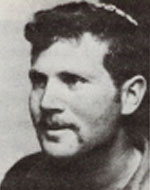Eliyahu (Eli), son of Shoshana and Yosef, was born on August 15, 1951, in Netanya. He attended the Maalot elementary school, the high school yeshiva in Kfar Haroeh, and later at the “Yeshivat Hakotel” in Jerusalem, where Eli was a diligent student, consistently learning through every Mishmar/all night study session. His teacher wrote: “The dominant feature of his character was self-sacrifice. Once he said, ‘Learn not only for myself but also for others. To impart to others what I will accumulate for myself during the years when I will sit and study. ” Eli persevered in his Talmudic studies, as well as literature and history books. His essay “Definitions of the 600,000 (who stood at Mt. Sinai) in the public domain” earned him the Ministry of Religious Affairs prize for religious work. He was a member of Bnai Akiva Religious Zionist Youth Group, and all who knew him loved for his pleasant demeanor, generosity of spirit, and good Lev. He was steeped in Torah, which manifested in him love of people and love of the nation, yet he demonstrated tremendous physical strength, often on arduous journeys, even after nights of study, in order to physically prepare for his induction into the IDF in early August 1970, as he volunteered for the Shaked reconnaissance unit. Later, he wrote to his rabbi: “It is easy to prove that my place is in the yeshiva … but because of the difficult security situation, I know that if I continued to study, my conscience would not stop harassing me, every time I heard, of a soldier’s injury or death. (In view of all this, in normal times I would have reached a different decision). ” After basic training, he took a parachuting course, a course for scouts and a course for infantry commanders. Since he excelled in his role, he was sent by his commanders to the infantry officers course and completed successfully there, he was assigned to a field unit, and he was considered a talented officer with initiative, dedicated and responsible, who excelled in good perception and a strong desire to advance and served as a personal example of his subordinates and commanders. He received “The Medal of Honor” for saving, in May 1971, at risk to himself, children from the refugee camp in Jabalya, and insisting to his comrades to ignore his wounds until after the children of Jabalya were all saved.
The newspaper “Bamachane” (“in the Camp”) published an article “Eli the Commander, and the children” in which he was told about this act. On the twenty-fourth Independence Day, he was among the 100 outstanding soldiers received by the President of Israel, Zalman Shazar, at his residence. For a few months Eli then served in the army career track. During the Yom Kippur War, Eli participated with his unit in the fierce battles against the Egyptians on the Sinai front. On October 15, 1973, Eli fought as a commander of a company in Sayeret and advanced with his force on the “Nahal” axis on the banks of the Suez Canal, when his half-track was directly hit by a mortar shell. He was brought to eternal rest in the Kiryat Shaul cemetery, leaving behind his parents and two brothers. After his fall, he was promoted to captain. In a letter of condolence to the bereaved family, his commander wrote: “Eli was one of those unique individuals who were exemplary to their comrades and commanders and proud of their commanders. “His natural talents, his desire for perfection and his multi-faceted energy promoted him very quickly, and in the difficult and responsible task he was entrusted with was a great success; One of his subordinates, who later fell in the midst of the breakthrough, wrote about him: “A quiet and religious man who was moderate and courteous to all, while on the eve of Sukkot despite his exhaustion he pursued Etrog lulav, etc and Wine, so with the proper blessings he could fulfill these Mitzvot. “Yeshivat HaKotel” published a memorial volume entitled “By Fire and Water for the Sanctification of Your Name,” in memory of the yeshiva students who fell in the Yom Kippur War; the interview with Eli by Yaakov Agmon in Galei Tzahal, a few days before he fell, was published in the newspaper Haaretz, as “The Power of Faith”.
